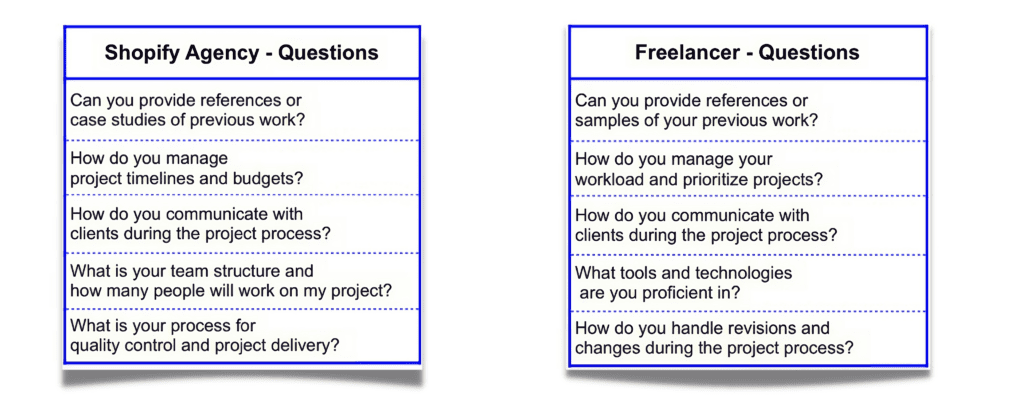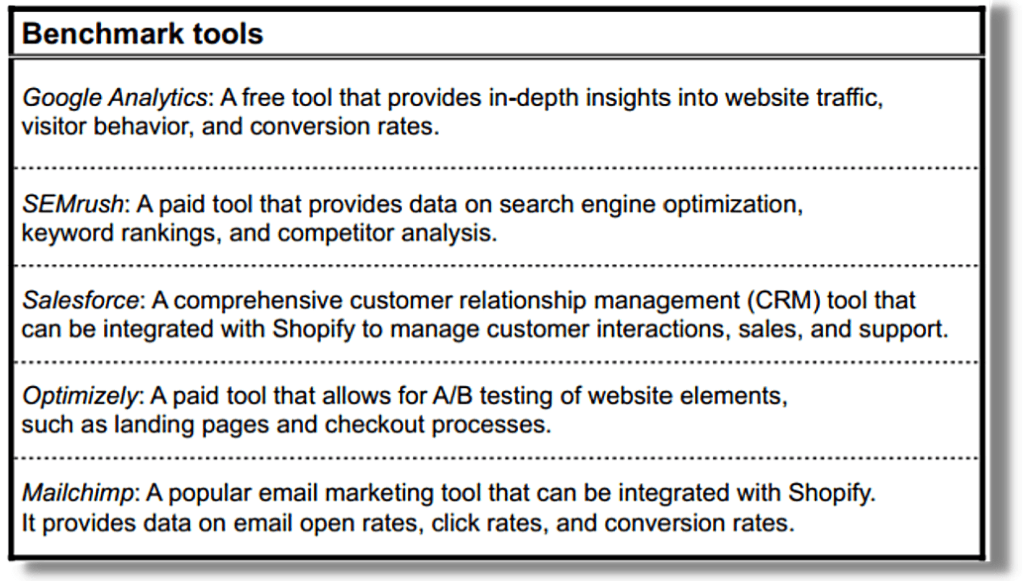Choosing the Right Shopify Pro for Success
Imagine you are an entrepreneur starting to sell online. You will obviously have many questions. Where and how to start best and with whom, for example. Why do millions of stores trust Shopify? And when is hiring a professional recommended? The questions can take no end, so let’s first have a look at the most important ones to get started.
- How much time does it take to set up a Shopify store?
- How much money will it cost?
- Does it require special skills and/or expertise?
Why is Shopify a trusted platform?
Shopify is a popular e-commerce platform that is ideal for a variety of businesses, especially small to medium-sized online stores. With a user-friendly interface, Shopify makes it simple to set up and manage an online store, even if you have no technical expertise.
The time it takes to set one up mostly depends on factors such as number of products, level of theme customization, and third-party apps you plan to use.
Here are some of the top reasons of using Shopify:
Customizable Themes: Shopify has a range of free and paid themes from their store to choose from. Allowing store owners to create a unique and attractive online store that reflects their brand.
Secure Payment Processing: Shopify integrates with multiple payment gateways and provides a secure platform to process payments.
App Store: Shopify has a large app store, which offers a variety of plugins and extensions to enhance the functionality of your store.
So how much time and money is required?
Setting up a Shopify store from scratch can take anywhere from a day to even some weeks. The time you spend depends mostly on how much of the work you want to do yourself. With some experience and dedication, setting up a basic Shopify store is rather quickly done.
Shopify has a range of pricing plans, starting from $29/month for the basic plan. Generally, no special skills or expertise are required to set up a basic Shopify store. However, for more complex customizations, some technical knowledge and/or expertise is necessary. (E.g. SEO, translation and/or localization)
What’s the best strategy for starting an e-commerce store on Shopify?
Again, it depends on the different variables. To get a better idea, let’s have a look at two sample cases with different knowledge and experience in e-commerce. They both want to enter Shopify to expand their business. We will have a look at the best strategy to realize in the following:
Case #1: Business starting in e-commerce
Case #2: Business moving to Shopify
Business starting in e-commerce
Strategy:
Start by researching your target audience and your competitors. Identify your unique selling proposition (USP) and create a business plan. Choose a Shopify plan that suits your needs and budget. Use the Shopify free trial to get a feel for the platform before committing.
Choose a theme that matches your brand and business style. Shopify offers a variety of free and paid themes that you can customize to suit your needs. Set up your products and organize them into collections. Make sure you have high-quality product images and descriptions that accurately represent your products.
Set up payment methods and shipping options. Shopify integrates with a variety of payment gateways and shipping providers, making it easy to get started.
Launch your store and promote it through marketing and advertising. Use tools such as email marketing, social media, and Google Ads to reach your target audience.
Last but not least: Continuously monitor your store performance and adjust your strategy as needed.
Cost: The cost of starting a small Shopify store can range from $29 to $299 per month, depending on the plan you choose. The cost of marketing, advertising, and other additional tools can add to the overall cost.
Business already selling online, moving to Shopify
For business owners who are familiar with e-commerce, the process of migrating to Shopify stores can be more streamlined and focused on optimization. There are many factors to consider.
Strategy:
Choose a Shopify plan that suits your needs and budget. Start by researching Shopify and its features. Identify the benefits of moving to Shopify and determine if it is the right platform for your business.
Plan the migration process carefully. Consider factors such as data migration, product organization, payment methods, and shipping options.
Optimize your products for search engines (SEO) specifically for Shopify. Use keywords and meta descriptions to improve your products’ visibility on search engines. Set up payment methods and shipping options. Shopify integrates with a variety of payment gateways and shipping providers, making it easy to get started.
Launch your store and promote it through marketing and advertising. Use tools such as email marketing, social media, and Google Ads to reach your target audience. Continuously monitor your store performance and adjust your strategy as needed. Utilize tools such as Google Analytics to track your store’s performance and make decisions based on value data.
Cost: The cost of starting a small business starts at $29. A Medium-sized Shopify store can range from $299 to $2,000 per month, depending on the plan you choose. The cost of marketing, advertising, and other additional tools can add to the overall cost.
When do I need professional help?
While setting up a Shopify store is fairly straightforward and easy to use, complex customizations and integrations can often require the assistance of a professional. For instance, it’s one thing to have a functional store, but it’s another to maximize your sales and profits. You’ll need to focus on key factors like search engine optimization (SEO), localization, and translations.
This is where professional help can be a game changer. An experienced Shopify professional can help you customize your store for maximum results, creating a unique and attractive design to reflect your brand.
Finally, it’s up to you to decide what you’re willing to tackle on your own, and when professional assistance is feasible. Keep in mind that professional help comes with a price tag, but it can pay off in the long run by getting ahead of your competition.
What is the major difference between an Agency VS a Freelancer?
The major difference between an agency and a freelancer is the scope and scale of their services and the size of their team. Hence, your individual needs and budget define the best choice.
An agency typically has a larger team of professionals with a range of skills and expertise. They can offer a broader range of services, including strategy, design, development, and marketing. They usually work with larger clients and have the resources to handle multiple projects simultaneously. Hence, they are generally more expensive than freelancers.
A freelancer is typically a contractor with a specific skill set. They generally offer more focused and specialized services. They usually work with smaller clients and/or on individual projects. Therefore, they are mostly more affordable than agencies.
What are the most relevant questions to ask?
To find the best agency or freelancer to work with, it’s essential to ask the right questions. Be sure to send these questions to at least 2 or 3 providers, so you can compare their answers and make an informed decision. Doing so will provide you with valuable data and information, allowing you to choose the best match for your needs.

As you can see, the important questions are mostly the same for an Agency or Freelancer. Therefore, it depends on the scale of operation and budget.
How to detect a good provider?
Clearly, when entrusting your money to a professional, you want to ensure that you find the most suitable one. Here are some useful characteristics of each to help you identify the best professional for your specific needs.
Agency Characteristic:
Portfolio: Look at their portfolio to see the quality and variety of their work.
Testimonials: Read testimonials from their previous clients to get a sense of their working style and client satisfaction.
Communication: Good agencies have clear and regular communication with their clients, keeping them informed and involved throughout the project process.
Processes and Systems: Good agencies have established processes and systems in place for managing projects, budgets, timelines, and quality control.
Expertise: A good agency should have a team of experts with a range of skills and experience.
Freelancer Characteristic:
Portfolio: Look at their portfolio to see the quality and variety of their work.
Testimonials: Read testimonials from their previous clients to get a sense of their working style and client satisfaction.
Communication: Good freelancers have clear and regular communication with their clients, keeping them informed and involved throughout the project.
Availability: Good freelancers are reliable and have a good track record for meeting project deadlines.
Expertise: A good freelancer should have a clear area of expertise and a strong portfolio to demonstrate their skills.
Lastly, it is important to note that for both solutions to work, it is essential to have the right “Chemistry” between team members. Working with someone you don’t like can be detrimental to the overall success. However, when there is mutual respect and appreciation, the workflow becomes more efficient and effective.
Which tools can I use to benchmark my strategy?
To develop a strategy and evaluate the performance of an e-commerce store on Shopify, there are numerous benchmarking tools available. Among the most widely used tools are:

Benchmark questions:
- Amount and Type of Traffic?
- Number of Sales?
- What is the Conversion Rate …. ROI?
Choosing the appropriate set of tools that cater to the requirements of your e-commerce store is crucial. Regularly monitoring and fine-tuning your strategy based on the insights provided by these tools can assist you in maximizing your efforts and attaining your intended outcomes.
Do I have to be an expert to use and understand those?
You do not need to be an expert to use and understand these tools, although some basic understanding of digital marketing, website analytics, and e-commerce may be helpful. Most of these tools offer resources, tutorials, and support to help you get started and use them effectively.
Most of these tools are either free or offer a free trial period, but some of them require a subscription after the trial period. The cost of a subscription can vary depending on the features and level of support you need, e.g. Google Analytics is for free, others can cost up to several hundred dollars per month (offering additional features).
Hence, it is important to evaluate your needs and budget before choosing which tools to use. Some businesses may only need a few basic tools, while others may need a more comprehensive suite of tools to effectively manage their e-commerce store.
What’s Next
With our insights above, you can ensure the success of your Shopify store. It is crucial to consistently monitor its performance and adjust your strategy accordingly. Utilizing tools like Google Analytics can provide valuable data to track important metrics such as website traffic, conversion rates, and customer engagement. This information will help you identify areas that require improvement, allowing you to make informed decisions and optimize your store for maximum results.
It’s important to remember that achieving success in e-commerce requires patience and dedication. Continuously prioritize excellent customer service and high-quality products, to maximize your sales, and remain open to feedback. By being committed to your goals, you can establish a thriving e-commerce business on Shopify.
langify The First Translation app on Shopify – since 2014

“Business is the profession. Harmony the passion.”
Connecting people and customers is the key. In e-commerce & general. Tones & Music are a wonderful communication tool. Only 7 tones define it and are understood all around the world

